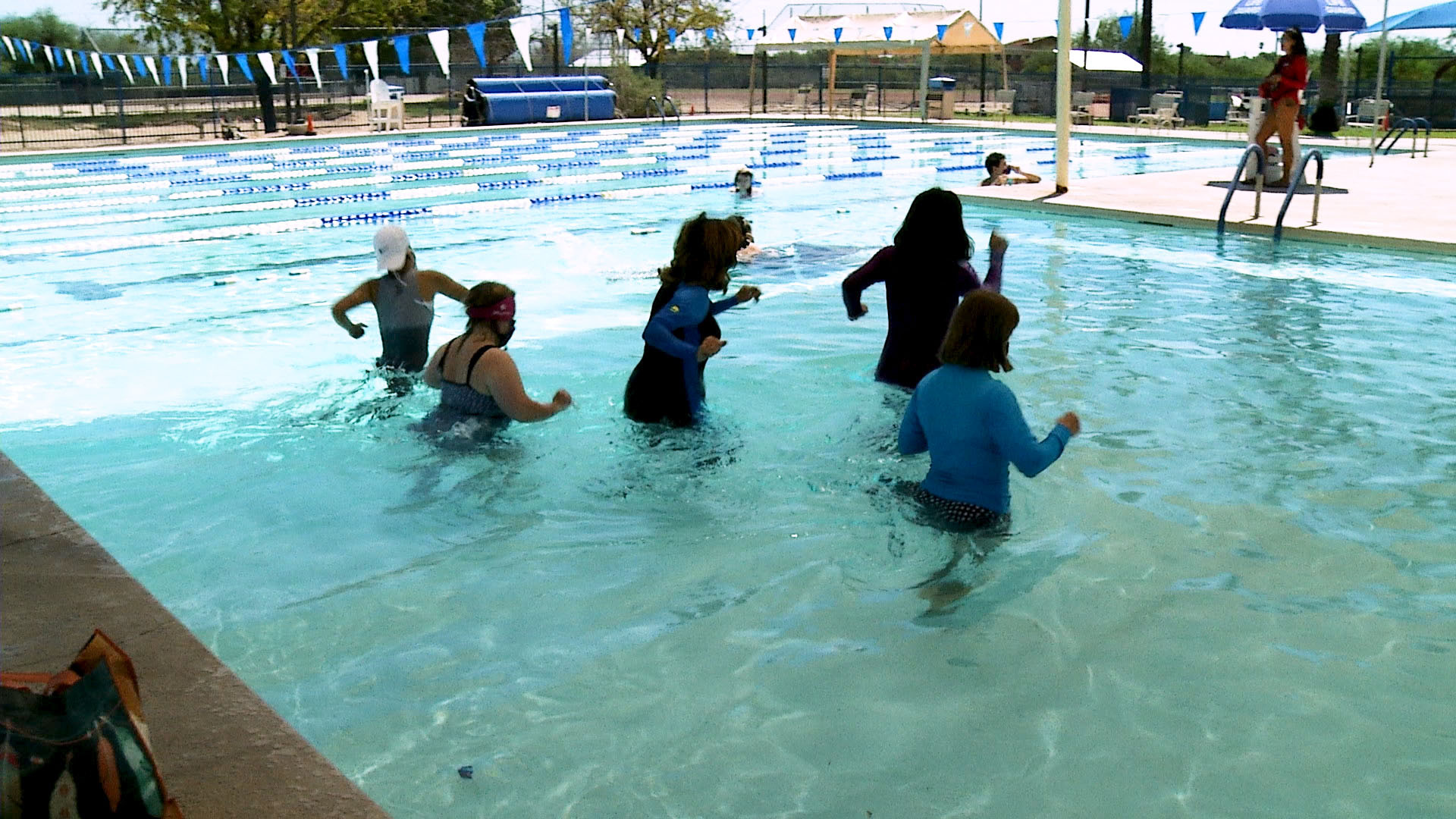 Adults in the Tucson Jewish Community Center's day program for people with disabilities swimming at the J Sept. 3, 2020.
Adults in the Tucson Jewish Community Center's day program for people with disabilities swimming at the J Sept. 3, 2020.
While some challenges in the pandemic are unique for people with disabilities — like how to design clear face coverings — many others in education, day care or in the work force mirror the barriers people without disabilities are facing this year.
The Arizona State School for the Deaf and Blind in Tucson didn't anticipate spring break being the threshold to virtual learning. Kelly Creasy, the school's principal, said when they decided not to bring the kids back to campus, they sent out more than 100 devices to students who were now learning from home all across the state.
"We were very fortunate that we have enough devices on campus. But to be honest, if something breaks right now, trying to get extra iPads, Chromebooks is proving almost impossible."
She said they sent out approximately 20 hot spots, 80 Chromebooks, 35 iPads and 12 BrailleNote Touches, which are basically laptops that produce refreshable braille. Like many other schools, being connected to the internet keeps the approximately 120 students connected to their individual classrooms.
"There's nothing that can replace face-to-face instruction, and our kids come to our campus because they were referred by their home district because they need specialized, intensive instruction," Creasy said.
But unlike public schools, some of Creasy's students live part time on campus. Before the pandemic hit, about 45 students were living in the dorms, because commuting to and from home was not an option. Now Creasy said 15 students are on campus learning online from their dorm rooms, because at home they don't have a reliable internet connection, among other utility gaps.
"We have families that live in places without electricity or running water," Creasy said. "We always knew that, and we always work with those families to support them as best we can, but during this pandemic all of that has come to the forefront."
Creasy said the problem is inequity in resources, and though she said she is seeing some solutions from local governments, she's not hopeful change will come quickly.
“I don’t know that [the students] all have what they need to succeed," Creasy said.
She said she hopes to get kids back in the classroom by the end of October with students sleeping in their own rooms and dorms broken up in pods, and with that comes proper personal protective gear preparations. They're stocked with Humanity Shields — face shields with a fabric curtain that covers the neck — and they also have clear face masks. She said seeing a person's full face helps increase communication for deaf and low-vision students.
In addition to kids, some adults with disabilities in Tucson have also missed out on in-person instruction, especially during Arizona's shelter-in-place order this spring. The Tucson Jewish Community Center's day program, Taglit, serves adults under 39 years old who could benefit from a care provider or socialization.
Todd Rockoff, the J's CEO, boasts that before the pandemic Taglit had 47 participants — around Labor Day that number was almost cut in half.
"We provide programs and services and vocational training and social interaction in a really dynamic way," Rockoff said. "Many of the participants have a one-on-one advocate, and it's a very, very meaningful program."
The J decided to close in March for health and safety reasons, but Rockoff said the closure didn't keep Taglit apart. He said they still met virtually. It wasn't until June 1 that the J reopened.
"The day program in a community setting is critical because it helps the entire community experience each other and to recognize that things that we felt were barriers are absolutely not," Rockoff said.
The closure raised a lot of anxiety about access to education and day programs. J.J. Rico, the executive director of the Arizona Center for Disability Law, said during the pandemic protections like the Americans with Disabilities Act seemed to have been forgotten.
"There was concern [from the public] of, 'If I get COVID, am I going to have access to the health care that I need at a hospital, or are they going to look at me as less valuable because I'm a person with a disability?'" Rico said.
Rico said that the center has been having to remind the state, agencies and providers that people with disabilities have civil rights and access to health care is one of them.
He said during the pandemic society has proven it can establish inclusive practices. Rico said before the pandemic some people with disabilities would request to work from home, but their bosses told them, "'There's no way that we can accommodate you. This job just can't be done remotely.'" But now, Rico said the mass amounts of people working from home in multiple fields has disproven that narrative, and those with disabilities should make another reasonable accommodation request from their employers.
Rico said if more people with disabilities were in power, the Arizona Center for Disability Law wouldn't have had to remind as many people about the needs of those with disabilities during the COVID-19 pandemic.
"We can't go backwards, so after this time people will talk about, 'How is life going to be different or the same as before the pandemic?' It will never be the same and it shouldn't, especially for people with disabilities," Rico said.

By submitting your comments, you hereby give AZPM the right to post your comments and potentially use them in any other form of media operated by this institution.